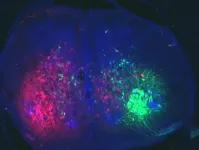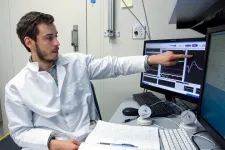(Press-News.org) For decades, the ice shelf helping to hold back one of the fastest-moving glaciers in Antarctica has gradually thinned. Analysis of satellite images reveals a more dramatic process in recent years: From 2017 to 2020, large icebergs at the ice shelf's edge broke off, and the glacier sped up.
Since floating ice shelves help to hold back the larger grounded mass of the glacier, the recent speedup due to the weakening edge could shorten the timeline for Pine Island Glacier's eventual collapse into the sea. The study from researchers at the University of Washington and British Antarctic Survey was published June 11 in the open-access journal Science Advances.
"We may not have the luxury of waiting for slow changes on Pine Island; things could actually go much quicker than expected," said lead author Ian Joughin, a glaciologist at the UW Applied Physics Laboratory. "The processes we'd been studying in this region were leading to an irreversible collapse, but at a fairly measured pace. Things could be much more abrupt if we lose the rest of that ice shelf."
Pine Island Glacier contains approximately 180 trillion tons of ice -- equivalent to 0.5 meters, or 1.6 feet, of global sea level rise. It is already responsible for much of Antarctica's contribution to sea-level rise, causing about one-sixth of a millimeter of sea level rise each year, or about two-thirds of an inch per century, a rate that's expected to increase. If it and neighboring Thwaites Glacier speed up and flow completely into the ocean, releasing their hold on the larger West Antarctic Ice Sheet, global seas could rise by several feet over the next few centuries.
These glaciers have attracted attention in recent decades as their ice shelves thinned because warmer ocean currents melted the ice's underside. From the 1990s to 2009, Pine Island Glacier's motion toward the sea accelerated from 2.5 kilometers per year to 4 kilometers per year (1.5 miles per year to 2.5 miles per year). The glacier's speed then stabilized for almost a decade.
Results show that what's happened more recently is a different process, Joughin said, related to internal forces on the glacier.
From 2017 to 2020, Pine Island's ice shelf lost one-fifth of its area in a few dramatic breaks that were captured by the Copernicus Sentinel-1 satellites, operated by the European Space Agency on behalf of the European Union. The researchers analyzed images from January 2015 to March 2020 and found that the recent changes on the ice shelf were not caused by processes directly related to ocean melting.
"The ice shelf appears to be ripping itself apart due to the glacier's acceleration in the past decade or two," Joughin said.
Two points on the glacier's surface that were analyzed in the paper sped up by 12% between 2017 and 2020. The authors used an ice flow model developed at the UW to confirm that the loss of the ice shelf caused the observed speedup.
"The recent changes in speed are not due to melt-driven thinning; instead they're due to the loss of the outer part of the ice shelf," Joughin said. "The glacier's speedup is not catastrophic at this point. But if the rest of that ice shelf breaks up and goes away then this glacier could speed up quite a lot."
It's not clear whether the shelf will continue to crumble. Other factors, like the slope of the land below the glacier's receding edge, will come into play, Joughin said. But the results change the timeline for when Pine Island's ice shelf might disappear and how fast the glacier might move, boosting its contribution to rising seas.
"The loss of Pine Island's ice shelf now looks like it possibly could occur in the next decade or two, as opposed to the melt-driven subsurface change playing out over 100 or more years," said co-author Pierre Dutrieux, an ocean physicist at British Antarctic Survey. "So it's a potentially much more rapid and abrupt change."
Pine Island's ice shelf is important because it's helping to hold back this relatively unstable West Antarctic glacier, the way the curved buttresses on Notre Dame cathedral hold up the cathedral's mass. Once those buttresses are removed, the slow-moving glacier can flow more quickly downward to the ocean, contributing to rising seas.
"Sediment records in front of and beneath the Pine Island ice shelf indicate that the glacier front has remained relatively stable over a few thousand years," Dutrieux said. "Regular advance and break-ups happened at approximately the same location until 2017, and then successively worsened each year until 2020."
INFORMATION:
Other co-authors are Daniel Shapero and Ben Smith at the UW; and Mark Barham at British Antarctic Survey. The study was funded by the U.S. National Science Foundation, NASA and the U.K. Natural Environment Research Council.
For more information, contact Joughin at ian@apl.washington.edu and Dutrieux at pitr1@bas.ac.uk
PHILADELPHIA - Cells contain machinery that duplicates DNA into a new set that goes into a newly formed cell. That same class of machines, called polymerases, also build RNA messages, which are like notes copied from the central DNA repository of recipes, so they can be read more efficiently into proteins. But polymerases were thought to only work in one direction DNA into DNA or RNA. This prevents RNA messages from being rewritten back into the master recipe book of genomic DNA. Now, Thomas Jefferson University researchers provide the first evidence that RNA segments can be written back into DNA, which potentially challenges the central dogma in biology and could have wide implications ...
BOSTON - Vitamin D deficiency strongly exaggerates the craving for and effects of opioids, potentially increasing the risk for dependence and addiction, according to a new study led by researchers at Massachusetts General Hospital (MGH). These findings, published in Science Advances, suggest that addressing the common problem of vitamin D deficiency with inexpensive supplements could play a part in combating the ongoing scourge of opioid addiction.
Earlier work by David E. Fisher, MD, PhD, director of the Mass General Cancer Center's Melanoma Program and director of MGH's Cutaneous Biology Research Center (CBRC), laid the foundation for the current study. In 2007, Fisher and his team found something unexpected: Exposure to ultraviolet (UV) rays ...
For centuries, scientists, aeronautic designers and adventure-seekers have sought to replicate the qualities that allow birds to fly, namely wing-structure and balance. However, without an external mechanism such as a hot air balloon or airplane, humans have remained earth-bound, unable to use their own bodies to propel themselves into the stratosphere.
While researchers have long-focused on structural factors, like wings, that define the category of bird, a recent study published Science Advances by Professor Avihu Klar at the Hebrew University of Jerusalem's Faculty of Medicine and Prof. Claudio Mello from Oregon Health and Science University found that there are specific molecular characteristics that distinguish birds from animals, and these differences allow birds to flap their ...
The enormous potential of Big Data has already been demonstrated in areas such as financial services and telecommunications. An international team of researchers led by the IPK Leibniz Institute has now tapped the potential of big data for the first time on a large scale for plant research. To this end, data from three projects were used to increase the predictive accuracy for yield in hybrid varieties of wheat.
"We were able to draw on the largest dataset published to date, which contains information from almost a decade of wheat research and development," says Prof. Dr. Jochen Reif, Head of the Breeding Research Department at IPK. ...
What The Study Did: Editorial team composition by gender, race, ethnicity and sexual orientation was assessed at 25 leading medical and scientific journals in this survey study.
Authors: James W. Salazar, M.D., M.A.S., of the University of California San Francisco, is the corresponding author.
To access the embargoed study: Visit our For The Media website at this link https://media.jamanetwork.com/
(doi:10.1001/jamainternmed.2021.2363)
Editor's Note: The article includes conflicts of interest disclosures. Please see the article for additional information, including other authors, author contributions and affiliations, ...
What The Study Did: International medical graduates often practice as physicians in locations and specialties less preferred by U.S. medical graduates. This study reports on physician mortality from COVID-19, and on the mortality of international medical graduates in particular.
Authors: Abraham Verghese, M.D., of Stanford University in California, is the corresponding author.
To access the embargoed study: Visit our For The Media website at this link https://media.jamanetwork.com/
(doi:10.1001/jamanetworkopen.2021.13418)
Editor's Note: The article includes conflict of interest and funding/support disclosures. Please see the article for additional information, ...
What The Study Did: Researchers describe international hospitalization trends and key epidemiological and clinical features of children and youth with COVID-19.
Authors: Paul Avillach, M.D., Ph.D., of Harvard Medical School in Boston, and Florence Bourgeois, M.D., M.P.H., of Boston Children's Hospital, are the corresponding authors.
To access the embargoed study: Visit our For The Media website at this link https://media.jamanetwork.com/
(doi:10.1001/jamanetworkopen.2021.12596)
Editor's Note: The article includes conflict of interest and funding/support disclosures. Please see the article for additional information, including ...
The term "doomscrolling" describes the act of endlessly scrolling through bad news on social media and reading every worrisome tidbit that pops up, a habit that unfortunately seems to have become common during the COVID-19 pandemic.
The biology of our brains may play a role in that. Researchers at Washington University School of Medicine in St. Louis have identified specific areas and cells in the brain that become active when an individual is faced with the choice to learn or hide from information about an unwanted aversive event the individual ...
What The Study Did: This study of patients hospitalized with COVID-19 examines the association of anticoagulation treatment with mortality rates.
Authors: Valerie M. Vaughn, M.D., M.Sc., of the University of Utah in Salt Lake City, is the corresponding author.
To access the embargoed study: Visit our For The Media website at this link https://media.jamanetwork.com/
(doi:10.1001/jamanetworkopen.2021.11788)
Editor's Note: The article includes conflict of interest and funding/support disclosures. Please see the article for additional information, including other authors, author contributions and affiliations, conflict of interest and financial disclosures, and funding and support.
INFORMATION:
Media advisory: The full ...
What The Study Did: Researchers compared the association between symptoms and SARS-CoV-2 RNA levels in children and adults.
Authors: Erin Chung, M.D., of the University of Washington School of Medicine in Seattle, is the corresponding author.
To access the embargoed study: Visit our For The Media website at this link https://media.jamanetwork.com/
(doi:10.1001/jamapediatrics.2021.2025)
Editor's Note: The article includes conflict of interest and funding/support disclosures. Please see the article for additional information, including other authors, ...


